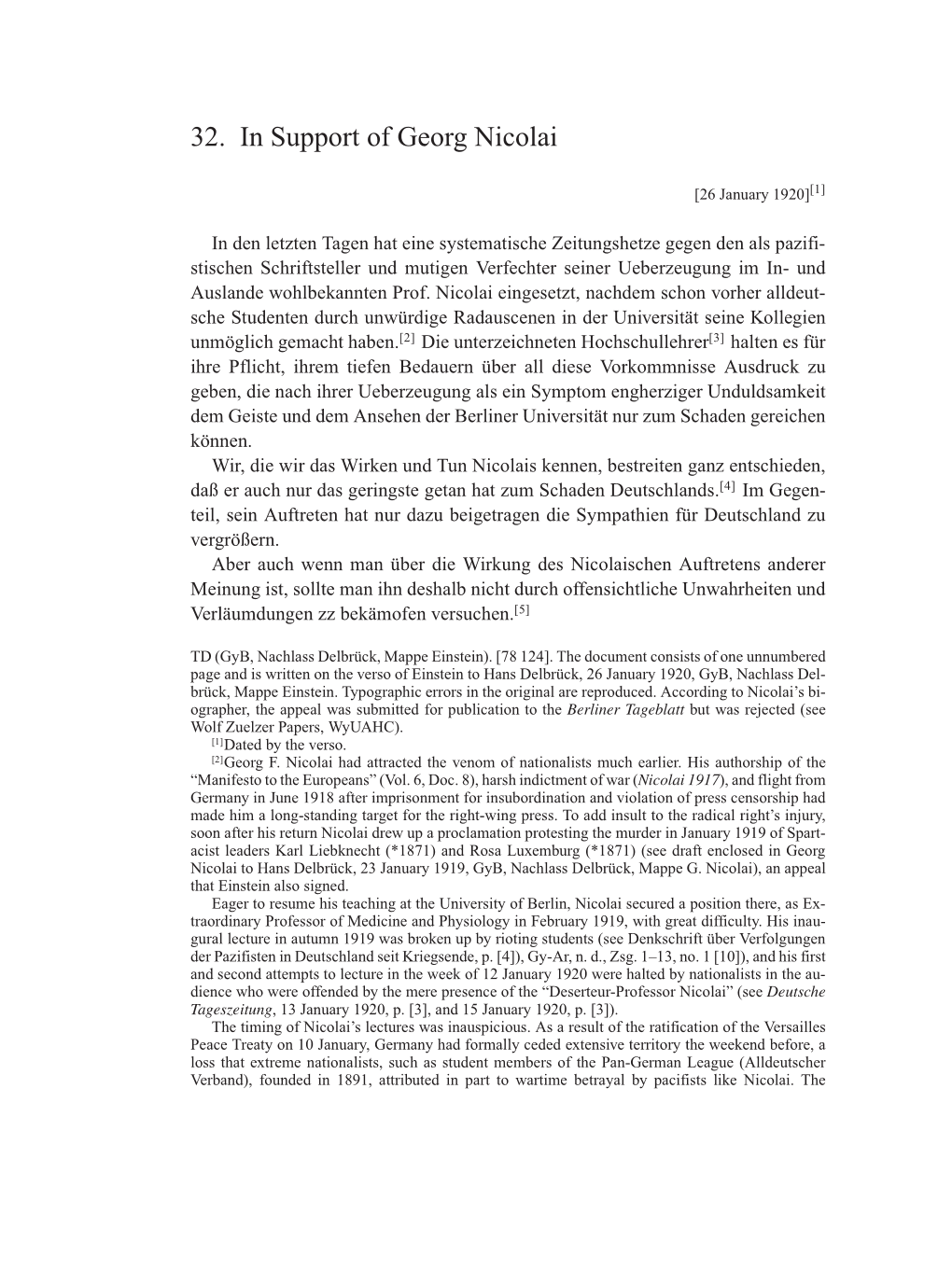2 8 2 D O C . 3 2 I N S U P P O R T O F N I C O L A I
32. In Support of Georg Nicolai
[26 January
1920][1]
In den letzten Tagen hat eine systematische Zeitungshetze gegen den als pazifi-
stischen Schriftsteller und mutigen Verfechter seiner Ueberzeugung im In- und
Auslande wohlbekannten Prof. Nicolai eingesetzt, nachdem schon vorher alldeut-
sche Studenten durch unwürdige Radauscenen in der Universität seine Kollegien
unmöglich gemacht
haben.[2]
Die unterzeichneten
Hochschullehrer[3]
halten es für
ihre Pflicht, ihrem tiefen Bedauern über all diese Vorkommnisse Ausdruck zu
geben, die nach ihrer Ueberzeugung als ein Symptom engherziger Unduldsamkeit
dem Geiste und dem Ansehen der Berliner Universität nur zum Schaden gereichen
können.
Wir, die wir das Wirken und Tun Nicolais kennen, bestreiten ganz entschieden,
daß er auch nur das geringste getan hat zum Schaden
Deutschlands.[4]
Im Gegen-
teil, sein Auftreten hat nur dazu beigetragen die Sympathien für Deutschland zu
vergrößern.
Aber auch wenn man über die Wirkung des Nicolaischen Auftretens anderer
Meinung ist, sollte man ihn deshalb nicht durch offensichtliche Unwahrheiten und
Verläumdungen zz bekämofen
versuchen.[5]
TD (GyB, Nachlass Delbrück, Mappe Einstein). [78 124]. The document consists of one unnumbered
page and is written on the verso of Einstein to Hans Delbrück, 26 January 1920, GyB, Nachlass Del-
brück, Mappe Einstein. Typographic errors in the original are reproduced. According to Nicolai’s bi-
ographer, the appeal was submitted for publication to the Berliner Tageblatt but was rejected (see
Wolf Zuelzer Papers, WyUAHC).
[1]Dated by the verso.
[2]Georg F. Nicolai had attracted the venom of nationalists much earlier. His authorship of the
“Manifesto to the Europeans” (Vol. 6, Doc. 8), harsh indictment of war (Nicolai 1917), and flight from
Germany in June 1918 after imprisonment for insubordination and violation of press censorship had
made him a long-standing target for the right-wing press. To add insult to the radical right’s injury,
soon after his return Nicolai drew up a proclamation protesting the murder in January 1919 of Spart-
acist leaders Karl Liebknecht (*1871) and Rosa Luxemburg (*1871) (see draft enclosed in Georg
Nicolai to Hans Delbrück, 23 January 1919, GyB, Nachlass Delbrück, Mappe G. Nicolai), an appeal
that Einstein also signed.
Eager to resume his teaching at the University of Berlin, Nicolai secured a position there, as Ex-
traordinary Professor of Medicine and Physiology in February 1919, with great difficulty. His inau-
gural lecture in autumn 1919 was broken up by rioting students (see Denkschrift über Verfolgungen
der Pazifisten in Deutschland seit Kriegsende, p. [4]), Gy-Ar, n. d., Zsg. 1–13, no. 1 [10]), and his first
and second attempts to lecture in the week of 12 January 1920 were halted by nationalists in the au-
dience who were offended by the mere presence of the “Deserteur-Professor Nicolai” (see Deutsche
Tageszeitung, 13 January 1920, p. [3], and 15 January 1920, p. [3]).
The timing of Nicolai’s lectures was inauspicious. As a result of the ratification of the Versailles
Peace Treaty on 10 January, Germany had formally ceded extensive territory the weekend before, a
loss that extreme nationalists, such as student members of the Pan-German League (Alldeutscher
Verband), founded in 1891, attributed in part to wartime betrayal by pacifists like Nicolai. The
